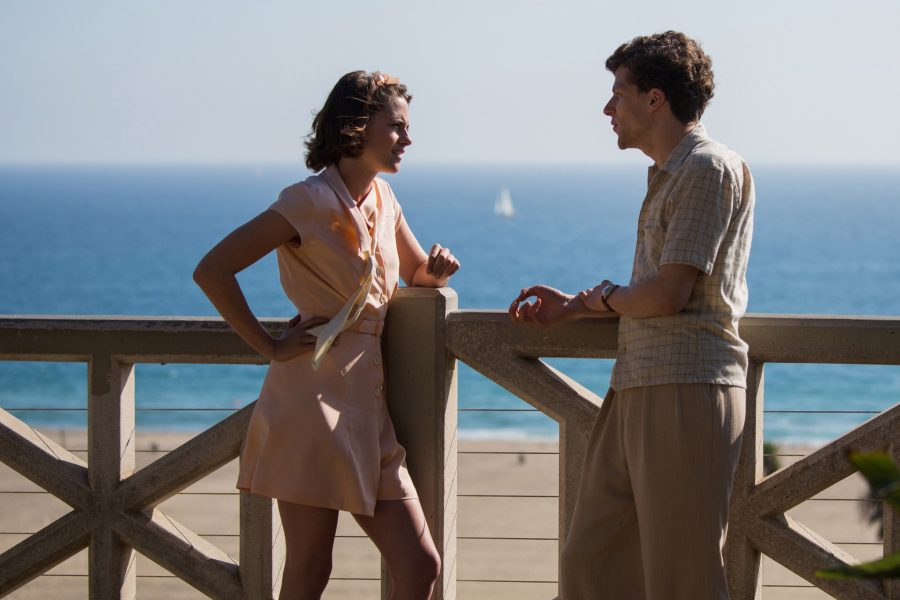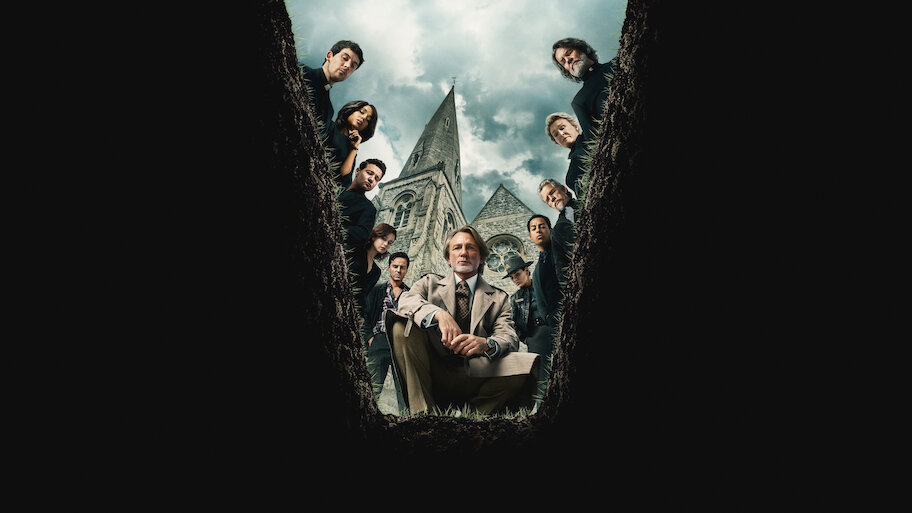Woody Allen is a restless soul. There’s a self-professed impending sense of doom that aids his need to annually direct and write (but no longer star in) a film. This distinctive blend of output and quality, which had taken form in the late ‘70s and continued throughout the ‘80s, forever marked Allen as an American wunderkind who had a knack for assembling great films. But unlike the Rob Reiners of the world, Allen has worked well past his expiration date and now shares more in common with latter-day Judd Apatow — working off deeply established connections in the film industry and coasting on reputation.
The young Bobby Dorfman (Jesse Eisenberg) has stumbled into existential malaise as the son of a jeweler, seeking work which isn’t stultifying but which is “something more,” and he’s entirely unsure of what that is. Quick vignettes that examine the lives of fellow family members — a gangster brother, bickering parents, an intellectual communist brother-in-law and a teacher-sister with a penchant for prose and punishment — breathe life into an otherwise static intro. Fortunately for him, he’s got a bona fide success of an uncle — Hollywood agent Phil (Steve Carell). After shipping himself to the lush and liberally-watered hills of 1950s Hollywood, he finds himself patiently waiting for three weeks before ever meeting the man.
With nothing but free time and an empty motel room, he decides to call up a prostitute — bumbling along his preferences when asked over the phone — but the scene feels clumsier than the call. The prostitute arrives late and her wet-eared nervousness combines with Bobby’s neuroses to out her as a newcomer on the job. Eisenberg soon starts delivering traditional hollow post ‘80s Allenese — quips on Jewish customs and high speed non-defenses — that are no more than a hollow exercise in Allen’s prolific ability to write. “There’s nothing sexy about a transaction,” Bobby yells the film’s thesis in the contractually required faux Woody Allen impression, and he’s damn right.
The intersection between romance and practicality sets the stage for this year’s version of Allen’s signature brand of cuckolded writer/director/intellectual/New Yorker who fights through life’s menagerie of winners and cheaters with preloaded complaints and little pluck in his step. However, the glory of nepotism and guilt soon work their power as Bobby becomes his uncle’s assistant — quickly becoming a master at completing remedial tasks. Phil tasks agency assistant Vonnie (Kristen Stewart) with driving Bobby around town to get a feel for it. While the two gentle souls are delivering exposition like they lay on their deathbed, they begin to fall for each other. Vonnie simultaneously reveals and deflates her thespian dreams on the drive through Beverly Hills, rousing support from the ever-charmed Bobby. As the day winds down and they arrive at a quaint Mexican restaurant, Bobby reveals his feelings and Vonnie reveals she has a journalist boyfriend.
But much to our surprise in this romantic comedy, their love is soon allowed to blossom when Vonnie runs to Bobby after a devastating barside breakup, as cinematographer Vittorio Storaro’s sumptuous browns and deep oranges fill the screen like an oil fresco.
Vonnie and Bobby make the most of the present, rollicking on the beach and going to daily dinner dates, but flail around when dealing with the prospects of their future. Professional and personal ambitions are a constant threat to the state of what seems to be a provisional if passionate relationship. The cuts to the lives of Bobby’s family in New York usually provide some quick laughs, whether it be over the parents crudely quantifying how Jewish the other is or his sister and brother-in-law trying to reason with a neighbor who isn’t quite neighborly, but his gangster brother Ben (Corey Stoll) feels lifted from another film. Each of his scenes, save for a sidesplitting final appearance, serves no end but to tonally clash and distract from the main plot threads.
Having one’s name beside “Woody Allen” on the marquis must feel like little more than just another mark on the checklist to be recognized as a Hollywood heavyweight, but there is certainly a level of legitimacy granted that a few of them seem to be striving for — namely Kristen Stewart and Steve Carell. Despite working with directors like Olivier Assayas and Bennett Miller, the actors have largely failed to gain the respect and recognition that “serious” actors receive. In spite of this hunger (or because of it), the deep bench of talent in the film makes for what feels like the cinematic equivalent of a B squad. Yet there’s no weak performance, with each actor putting his or her best into this film — a performer’s showcase that will best serve as padding in Oscar submission reels. Stewart and Eisenberg channel the chemistry that served them well in 2009’s “Adventureland,” continuing to impress their youthful but cynical posturing. Carrel doesn’t have as meaty a role, but manages to snake his way into the audience’s heart with a sincerity that has buoyed him since the days of Michael Scott.
The film loses whatever momentum it had two-thirds of the way through, squandering whatever charm and agency it had for an ill-advised return to New York. Despite Allen’s fascination with the Big Apple, he must have failed to take note of what a New York minute is, because the final third of the movie is a slog. The atmosphere is 50 percent bravado and 50 percent second-hand smoke, condensing into platitudes that begin to rain down as Bobby becomes a successful nightclub owner who has everything but the thing he truly wants — love.
Half-boring, half-fascinating. There’s a good film rolling around in the bloated shell of “Café Society,” but the predictability that Allen has fallen prey to makes it hard to see the pieces as anything but rearranged shards of his greater films.
Rating: C-
Director: Woody Allen
Starring: Jesse Eisenberg, Kristen Stewart, Steve Carell, Corey Stoll, Parker Posey
Release Date: July 29, 2016
Rated: PG-13
Image Courtesy of Cinemaholics















Dee • Jul 26, 2016 at 5:06 pm
Actors of fully Jewish background: Logan Lerman, Natalie Portman, Joseph Gordon-Levitt, Mila Kunis, Bar Refaeli, James Wolk, Anton Yelchin, Paul Rudd, Jennifer Jason Leigh, Emmanuelle Chriqui, Julian Morris, Adam Brody, Kat Dennings, Gabriel Macht, Sarah Michelle Gellar, Erin Heatherton, Lisa Kudrow, Lizzy Caplan, Gal Gadot, Debra Messing, Jason Isaacs, Jon Bernthal, Robert Kazinsky, Melanie Laurent, Esti Ginzburg, Shiri Appleby, Justin Bartha, Margarita Levieva, Elizabeth Berkley, Halston Sage, Seth Gabel, Corey Stoll, Mia Kirshner, Alden Ehrenreich, Debra Winger, Eric Balfour, Emory Cohen, Scott Mechlowicz, Odeya Rush, William Shatner, Leonard Nimoy.
Andrew Garfield and Aaron Taylor-Johnson are Jewish, too (though I don’t know if both of their parents are).
Actors with Jewish mothers and non-Jewish fathers: Jake Gyllenhaal, Dave Franco, James Franco, Scarlett Johansson, Daniel Day-Lewis, Daniel Radcliffe, Alison Brie, Eva Green, Joaquin Phoenix, River Phoenix, Emmy Rossum, Ryan Potter, Rashida Jones, Jennifer Connelly, Sofia Black D’Elia, Nora Arnezeder, Goldie Hawn, Ginnifer Goodwin, Amanda Peet, Eric Dane, Jeremy Jordan, Joel Kinnaman, Ben Barnes, Patricia Arquette, Kyra Sedgwick, Dave Annable, and Harrison Ford (whose maternal grandparents were both Jewish, despite those Hanukkah Song lyrics).
Actors with Jewish fathers and non-Jewish mothers, who themselves were either raised as Jews and/or identify as Jews: Ezra Miller, Gwyneth Paltrow, Alexa Davalos, Nat Wolff, Nicola Peltz, James Maslow, Josh Bowman, Winona Ryder, Michael Douglas, Ben Foster, Jamie Lee Curtis, Nikki Reed, Zac Efron, Jonathan Keltz, Paul Newman.
Oh, and Ansel Elgort’s father is Jewish, though I don’t know how Ansel was raised. Robert Downey, Jr. and Sean Penn were also born to Jewish fathers and non-Jewish mothers. Armie Hammer and Chris Pine are part Jewish.
Actors with one Jewish-born parent and one parent who converted to Judaism: Dianna Agron, Sara Paxton (whose father converted, not her mother), Alicia Silverstone, Jamie-Lynn Sigler.